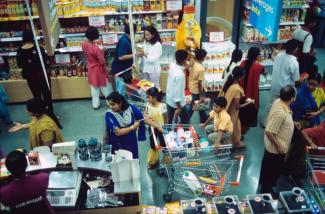Corporate Atlas 2017
Controlling our food

The Corporate Atlas 2017 highlights how the development of the food industry is affecting everyone. It also shows that the weakest links in the supply chain are hit hardest because farmers and farm workers in emerging markets and developing countries are entirely at the mercy of corporate powers. The report was published in mid-January by Heinrich Böll Foundation, Rosa Luxemburg Foundation, Friends of the Earth Germany (BUND – Bund für Umwelt und Naturschutz), Germanwatch, Oxfam and Le Monde Diplomatique.
All along the supply chain, companies are getting larger. Since 2015, 12 mega-mergers have occurred in the food and agriculture industry. Today, seven corporations are controlling the production of seeds and pesticides worldwide, but their number is likely to shrink to merely four by the end of 2017. Germany’s Bayer wants to buy Monsanto in the USA in order to become the world’s largest provider of agrochemicals. The US-based corporations DuPont and Dow Chemical are planning to merge, and ChemChina would like to acquire the Swiss-based multinational Syngenta. According to the Corporate Atlas, three of these corporations will control more than 60 % of the seed and agrochemical markets, and almost all will use genetically modified plants.
The more market power is concentrated in the hands of a few companies, the more dependent consumers become. The authors point out, however, that farms are affected even more as corporations dictate prices for seeds and pesticides.
The report notes that not only genetical engineering is changing agriculture. Digitalisation is doing so too. Agricultural enterprises increasingly depend on computerised management systems which small-scale farms cannot afford.
Once wheat, maize and soybeans are harvested, the so-called ABCD traders come into play. The four letters stand for four corporations that dominate the import and export of agricultural commodities: Archer Daniels Midland, Bunge, Cargill and Dreyfus. The first three are based in the USA and the latter in the Netherlands. The Corporate Atlas reckons that these corporations have enormous negotiating power since their combined share of the world market is 70 %.
According to the Atlas, the ABCD traders provide cheap commodities to large food companies including the likes of Unilever, Nestlé, Heinz, Mars, Kellog’s and Tchibo. These companies, in turn, are the top suppliers of supermarket chains. In Germany, four such chains account for 85 % of retail food sales. According to the authors, the supermarket managers are the gatekeepers – they determine what items make it onto the shelves and thus decide who produces the food and how it is produced.
The pressure on the supply chain is growing, according to the report, as food producers pay to get their products onto supermarket shelves. They pass on pressure, so farmers must work harder for less money. The Atlas points out that supermarket chains are expanding fastest in middle-income countries like India, Indonesia and Nigeria. Regardless of where the “supermarket revolution” occurs, it hurts traditional shops and markets.
The food industry claims to fight world hunger by increasing food production. According to the Corporation Atlas 2017, however, the productivity of cultivated farmland has not increased. In fact, millions of hectares of farmland are used to produce animal feed and biofuel, and such monocultures are destroying some 24 billion tons of fertile soil every year. The Corporate Atlas insists that the reason for 800 million people being malnourished is not the lack of food but its unfair distribution.
The agencies that published the Corporation Atlas 2017 want governments to assume responsibility. They demand that anti-trust legislation be improved in Germany in order to protect consumers and farmers from corporate powers. Moreover, the agencies are in favour of environment-friendly agriculture, which they consider the only way to improve yields to the benefit of farmers and consumers.
Link
Konzernatlas 2017 (in German):
https://www.oxfam.de/ueber-uns/publikationen/konzernatlas-2017






